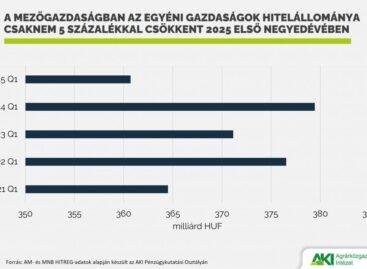The productivity of agriculture can increase significantly
With the smart use of subsidies from the 2023-2027 EU development cycle in Hungarian agriculture, productivity can increase by one and a half times and the added value by two times by the end of the decade – said the Parliamentary State Secretary of the Ministry of Agriculture at the Agricultural Sector 2022 conference in Siófok on Wednesday.

(Photo: Pixabay)
Sándor Farkas called it a historic opportunity that the European Commission adopted the Hungarian CAP (common agricultural policy) strategic plan for the next development cycle at the beginning of November. He also spoke about the fact that many parts of the world are facing food security challenges not seen for decades, which makes agriculture a strategic sector. He reminded that the drought, which indicates a climate crisis, devastated 81 percent of the country in mid-August. Efficiency in agricultural production can be the key to survival, he said. He emphasized that in order for the sector to remain competitive, it is essential to run ahead, and modernization is necessary even if the economic environment is not favorable for this. He recalled that the government helps the liquidity situation of farmers in several ways. As an example, he mentioned the loan moratorium, the interest rate freeze, and the fact that, from October 17, advance and installment payments of EU subsidies, which were HUF 322 billion higher than last year, were launched. So far, HUF 250 billion advances have been transferred to 150,000 farmers, he noted.
Investments are important
He also mentioned that the “record-sized” tender opportunities for the development of the agricultural sector, announced for last year and this year, will continue in the 2023-27 cycle. The Hungarian government provides national additional funding to the maximum extent provided for by EU law in addition to rural development resources – he emphasized. More than half of the rural development resources, almost HUF 1,500 billion, are intended to be used for economic development, more than HUF 1,000 billion will serve sustainability goals, he added. From next year, those that help agricultural producers adapt to today’s conditions will be decisive in rural development subsidies, said the state secretary. As an example, he mentioned that, according to the plans, priority will be given to investments aimed at increasing added value and the efficiency of energy use, or encouraging water conservation management.
Speaking about the drought, he emphasized that the renewal of water management in the Great Plain is unavoidable
He recalled that the regulation of the Tisza was a great thing in the 1800s, but today we are moaning about its negative effects. “Groundwater levels have fallen so low that there are farmers who have stopped raising livestock because the water in their wells has run out,” he said, calling the situation a tragedy. He pointed out that many places in the Great Plains must return to retaining water and winter precipitation. The compensation law also caused enormous damage, he noted, adding that areas that increase water retention must be restored. With these steps, as well as with the necessary water management facilities, it will take 10-15 years for the groundwater level to normalize, said Sándor Farkas.
MTI
Related news
András Tállai: “There is strong intent and potential for development in the sector”
András Tállai, state secretary of the Ministry of Agriculture talked…
Read more >Agricultural loans decreased by 6 percent
Agricultural loans decreased by 6.0 percent to HUF 1,001.2 billion…
Read more >Agriculture’s income-generating capacity may depend on irrigation
Europe is facing an increasingly significant water shortage, so agriculture’s…
Read more >Related news
WHO: They urge a 50 percent price increase for tobacco, alcohol and sugary drinks
The World Health Organization (WHO) is calling for the prices…
Read more >Eurozone economic growth accelerated in June
The eurozone’s economic performance accelerated in June, according to the…
Read more >This is how drug prices are changing: the government introduced price restrictions
The Ministry of National Economy’s price restrictions on medicines came…
Read more >






